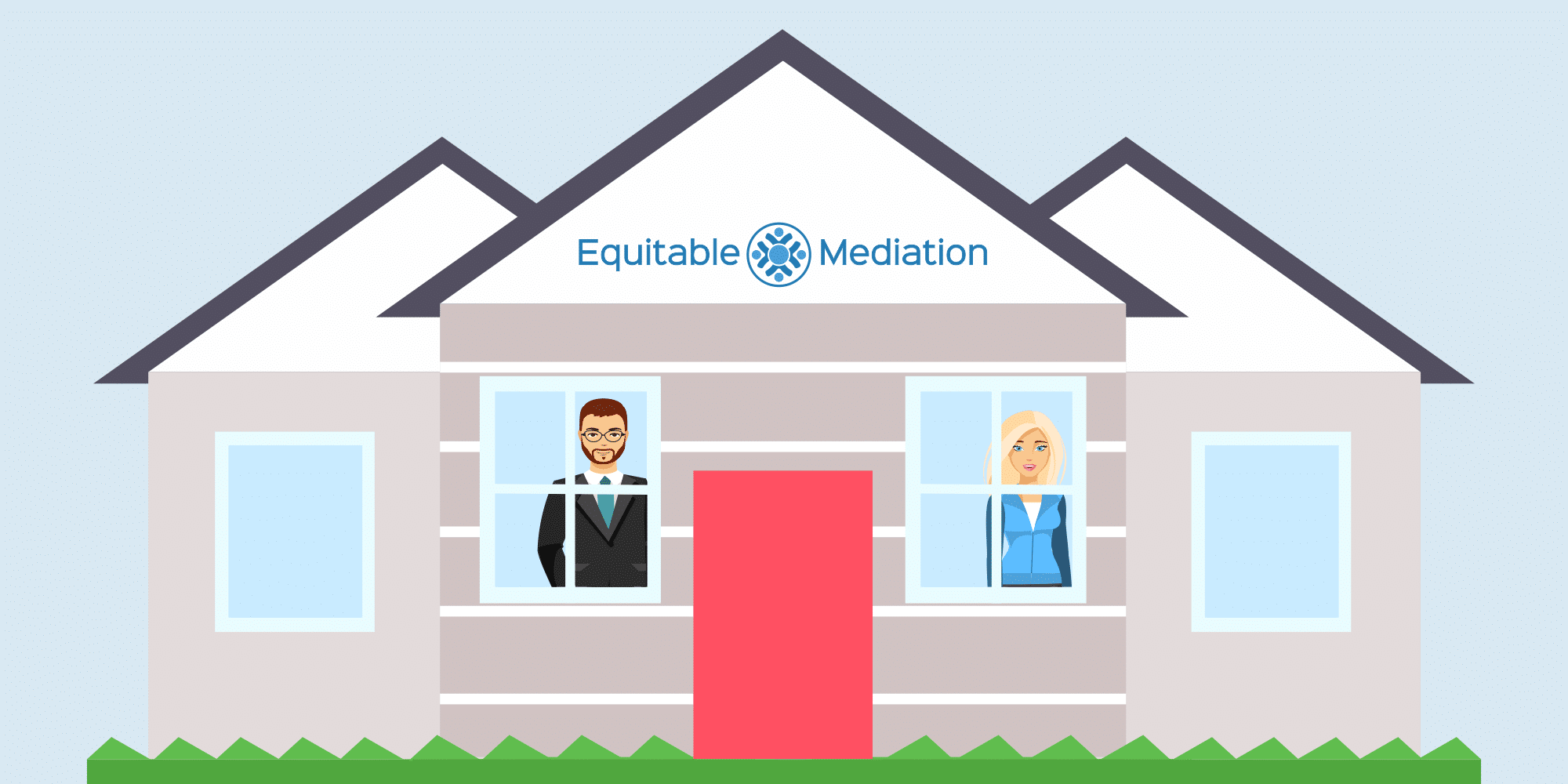You would think getting a divorce after 10 years would seem less complicated than divorces after longer-term marriages. But in my experience as a divorce mediator, that’s not usually the case. Because there’s a lot at stake when divorcing after 10 years of marriage, and there’s very little guidance on how things should be divided and decided, things can get complicated. And quickly!
In this post, we’ll explore what you can do when after a 10 year marriage, divorce is inevitable. And steps you can take if you don’t want your divorce proceedings to take forever, cost a fortune or destroy your family in the process.
But before we do that, let’s understand first why the 10-year mark is such an important milestone when ending a marriage.
4 Reasons divorce after 10 years is such a critical milestone:

1. In a divorce after 10 years, you’ve likely co-mingled your assets and liabilities
In a divorce after a short term marriage, couples likely haven’t yet co-mingled their assets or liabilities. They still each have separate property and debts such as checking accounts or credit cards, and statements from their pension or 401(k) from before they got married. Which makes figuring out who gets what less complicated when they divorce.
But after being married 10 years, divorce is more difficult because it’s more likely you and your spouse commingled many or all of your assets and liabilities. At the 10-year mark, you most likely have joint marital property like joint checking and savings accounts, or joint credit cards.
You may even have purchased a house and used funds from your separate accounts to make this joint purchase. And you’re well on your way towards accumulating enough money in your retirement accounts for your golden years.
You’ve joined your lives together financially. Which will make separating your assets and liabilities all the more complex.
2. In a divorce after 10 years, one of you may work inside the home while one of you works outside of it
If you’re like many of the couples I work with, you were married a few years before you decided to have children and expand your family. And you may have decided it would be best for one of you to stay at home with the kids.
So when seeking a divorce after 10 years, if you’re the one home with the kids, you’ve probably been out of the workforce just long enough that jumping right back in and earning what you used to earn may be difficult – if not impossible!
Even if you and your spouse are both working outside the home, you probably rely on each other quite a bit for your daily routine. Because your kids are in the phase where school, homework, after-school activities, sports, religious education, and being invited to friends’ birthday parties are in full swing. I can hear you saying “tell me about it Joe…”
For couples married 10 years, divorce is disruptive to your “normal” routine. And changing that now, especially while your kids are young, can be quite a challenge.
3. How long spousal support/alimony payments will last to your former spouse can change at the 10 year mark
The duration of your marriage can also often determine how long you pay or receive alimony / spousal support (also referred to as maintenance or spousal maintenance). And in some states, such as California, divorce after 10 years represents a significant milestone when it comes to alimony obligations.
Some states consider a divorce before 10 years of marriage a “shorter term.” So the duration of spousal support isn’t as long as it would be for a couple married 10 years or more. And while I’m not suggesting you should stay stuck in an unhappy marriage on the chance it will increase the duration of spousal support, I’m simply saying how alimony is determined can sometimes change at the 10-year mark.
4. If you’re of retirement age, your Social Security benefits may be impacted when divorcing after 10 years
Rarely does getting a divorce involve good news. But when it comes to Social Security, divorce after 10 years is an exception. If you and your spouse were married for 10 years or more, you may be eligible to receive Social Security based on your ex-spouse’s earnings. And receive greater benefits than if you were to collect on your own.
In order to be eligible for this increased benefit, you need to meet the following criteria:
- You are unmarried at the time you go to collect
- You are of eligible age (i.e. age 62 or older)
- Your ex-spouse is eligible for Social Security benefits; and
- The benefit you would receive, based on your own earnings history, would be less than the benefit you would receive if it were based on your ex-spouse’s earnings.
And if you’re the “ex-spouse” in this example, there is no impact whatsoever to the amount you, as the higher-earning ex-spouse, would collect from the Social Security Administration. And your marital status doesn’t matter, either. You can be re-married, divorced, or widowed, and your ex-spouse can still collect off of your earnings, with no impact on you (or your current spouse).
What is a wife entitled to after 10 years of marriage? Or husband?

So far you’ve learned 4 issues that can complicate things when divorcing after 10 years of marriage.
But now that you know what to watch out for, how do you address these challenges in a practical way? And figure out what a husband or wife is entitled to after 10 years of marriage in your divorce settlement?
When determining your roles as co-parents:

In the 80’s and 90’s, it was quite common for the wife (like my mom) to have custody of the children. With the majority of the parenting time going to her. While the husband (like my dad) was left to maybe one night during the week and every other weekend.
These days, 50-50 parenting plans are far more common. In fact, more than 80% of our mediation clients negotiate an equal time sharing plan in their agreements. That’s up from 10% when I first started mediating in 2008.
If you and your soon to be ex have children, you may think as the wife, you’re entitled to spend a majority of the time with the kids. And in some cases it may be. For example, if your spouse travels frequently for work, or commutes a great distance from home.
But what it really comes down to is it’s in your children’s best interests to see both of their parents as much as possible. That may be a 50-50 parenting plan, or one where the children spend a majority of the overnights with mom, and see dad every day for dinner, sleeping over his place on weekends.
However you and your husband (or wife) choose to determine your time sharing, is entirely up to you to negotiate.
When determining spousal support / alimony:

There’s a common misconception that simply being married for ten years automatically guarantees permanent spousal support / alimony. This thinking is especially common in California due to how some people interpret California law.
While the length of a marriage such as 10 years can significantly affect divorce negotiations, the reality is much more nuanced than that. As each divorce process depends on multiple factors specific to a couple’s unique situation and the jurisdiction in which they file.
In a divorce after 10 years of marriage, factors to consider when determining spousal support / alimony include:
- Each partner’s earning potential, contributions to the household, and future financial prospects;
- Any career interruptions or childcare responsibilities more significantly impacting one spouse;
- Any potential custody arrangements the parties have agreed to;
- Each spouse’s age, health, and employability;
- And the lifestyle maintained during the marriage.
Because there are very few states in the US that have an alimony guideline, it makes coming to agreement on this difficult issue even under the best of conditions.
Leaving it to the parties to negotiate a duration. Rather than simply accepting (another common misconception) that spousal support will last half the length of the marriage.
When dividing your assets and liabilities:

When deciding to call it quits after being married 10 years, divorce requires you to figure out “who gets what” of your marital assets and liabilities. And how that all happens depends on where you live.
For example, some states we practice in like Illinois, New Jersey, New York, and Pennsylvania, are equitable distribution states, while others like California and Washington State are community property states.
But whether you live in an equitable distribution state or a community property state, you and your divorcing spouse still have quite a bit of freedom to determine how you split your marital assets and debts.
There aren’t really any formulas or guidelines on how things should be divided between a couple. It just needs to be fair. But when it comes to divorce, what does fair even mean? Unfortunately, no one is exactly clear. As there aren’t many formulas on how to divide your assets and liabilities, and no clear definition of fair, you are both once again left to negotiate it.
Married 10 years? Divorce mediation is your best solution.

As you just learned, resolving the issues of a divorce after 10 years of marriage, aren’t so easy to do. And there really aren’t any clear cut laws, formulas, or guidelines that explicitly outline who’s entitled to what. That’s why you’ll get the best outcome when you negotiate the terms of your no-fault divorce agreement.
And that’s what mediation is all about.
With the right approach, like divorce mediation, you can get through this challenging time with your dignity intact, your finances less damaged, and a foundation for cooperative co-parenting that puts your family first. Without the need to ever set foot in a divorce court.
Key takeaways
- Divorcing after 10 years is significantly more complicated than divorcing after a shorter marriage, primarily due to the extensive co-mingling of assets, liabilities, and financial interdependence that typically occurs during this time.
- At the 10-year mark, couples often have joint property, shared retirement accounts, and more complex financial entanglements, making asset division more challenging compared to shorter-term marriages.
- Parenting arrangements have evolved, with 50-50 custody plans becoming increasingly common, focusing on the children’s best interests rather than traditional custody models from previous decades.
- The 10-year marriage milestone can impact spousal support (alimony) determinations, with some states treating marriages of 10 years or longer differently, but there’s no automatic guarantee of permanent alimony.
- The division of assets and liabilities depends on state laws (either equitable distribution or community property states), but ultimately requires negotiation between spouses to reach a fair agreement.
- Divorce mediation is recommended as the best solution for couples divorcing after 10 years, as it allows for more flexible, collaborative negotiations about asset division, child custody, and support arrangements.







